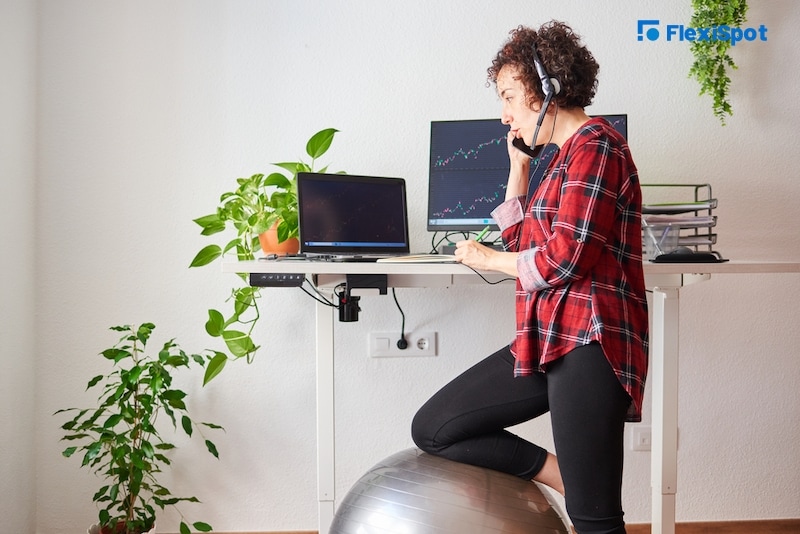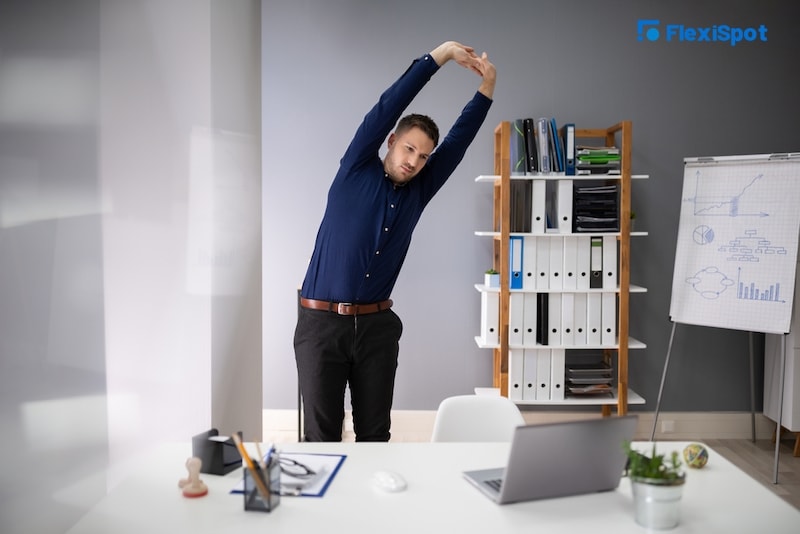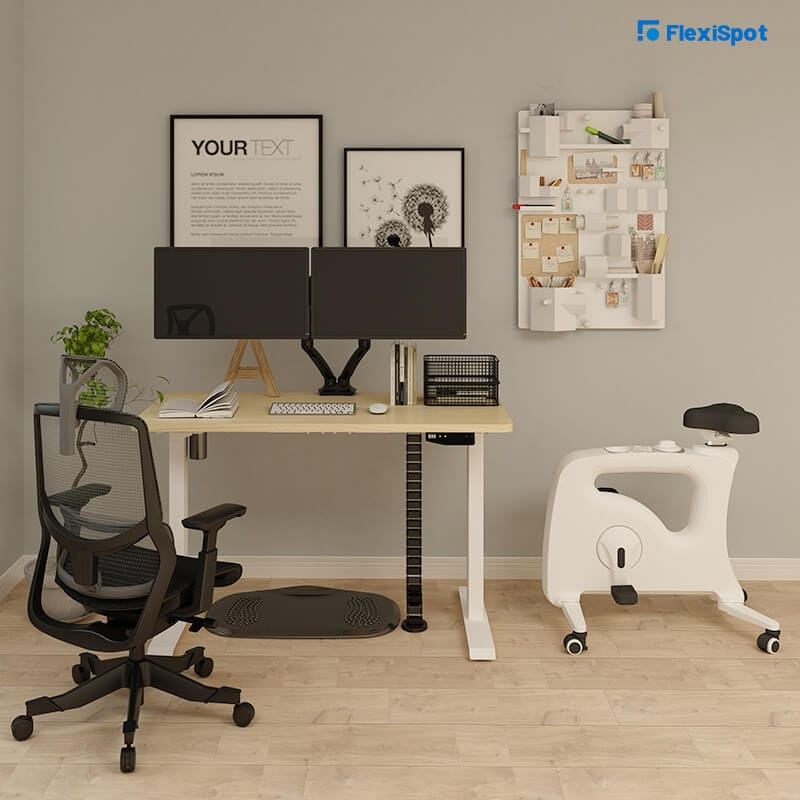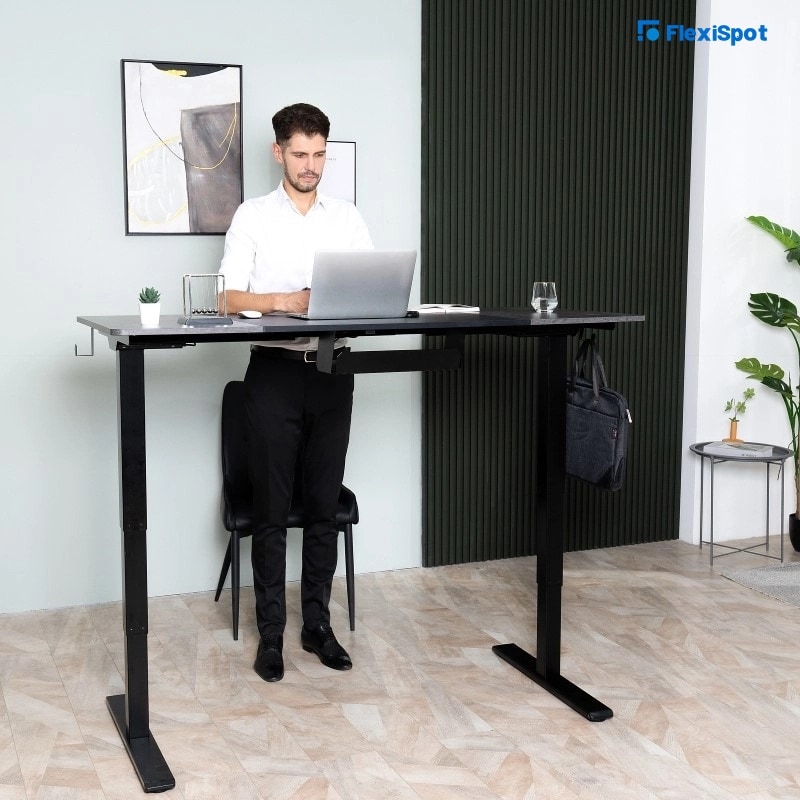You fiddled with your mouse. And for the umpteenth time, you try to focus on work. But the dull pain in your knees is officially the bane of your existence. It feels like a never-ending battle of pain.
You own an ergonomic chair and a standing desk. So, what could be the issue?
We always have an accusing finger pointed at the sedentary lifestyle. But what if a sedentary lifestyle isn’t the only cause of pain?
Standing desks-- the sedentary lifestyle antidote-- might be the cause of your knee pain. We’ve heard of different knee pain traced to standing desks. It’s one of the many occurrences with a looming question that lays unanswered. Can a standing desk affect your knees?
This article seeks to lay all worries to rest by providing answers. Ready to find answers?
Let’s get things underway!
Does standing desk affect your knees?
Standing isn’t a complicated posture. Unlike sitting, it encourages better blood circulation. Besides, it eliminates the problems a sedentary lifestyle fosters.
But like every other thing, there can be an overdose of standing. Standing for long entails some risks. However, the risks hardly surpass tension, pain, and discomfort. It rarely escalates into traumatic injuries.
You can feel any of these when you stand for a prolonged time or misuse the standing desk:
- Knee discomfort
- Fatigue
- Tension
- Joint stiffness
- Muscle pain in your legs and lower back
Why Do You Feel Pain While Standing?
Sometimes the pain and discomfort you experience while standing comes from the poor posture you accumulated in your daily life.
Poor posture can also occur due to previous injuries which you treated poorly. Or sometimes you haven’t fully recovered. Previous injuries may cause discomfort and pain, which prevents you from adopting a healthy posture.
That probably explains why you have to linger back pain even when living an active life.
Untreated injuries may cause knee pain. Why? You have to compensate for the joint that isn’t fully functional-- one way or the other.
For instance, if you sprained your ankle and haven’t treated it, you’d never want to rest your weight on it. The tension from this injury will force you to compensate with another joint. That’s where the snowball effect comes in-- extending to hip, knees, or back pains.
A problem may seem minor and cause excruciating pain to your body.
But this isn’t always the case. You may need to adjust your posture and pick a healthy alternative.
Check Your Body Awareness
People may have difficulty with body awareness. You may have experienced a hassle realizing your body position in your working environment.
It’s a big deal.
Such disorder leads to exaggerated movements. These movements do not only require excessive efforts, but they also expose you to inappropriate postures. The worst part is you won’t even realize it. Yet, you’d expend energy to the point of exhaustion.
If you are guilty of this, we will bet a buck that your standing posture would be wrong most times. Without body awareness, you’d end up putting your weight on the front of your feet while standing. Due to this faulty posture, your body makes efforts to prevent a fall forward. This effort causes fatigue and muscle imbalance over time.
Improve your Endurance and Mobility
Sticking to a posture during work is dicey. When your body adjusts to this position for a prolonged time, some of your muscles tend to become rigid. It may be impossible to move well. It can also happen even when you have a good posture.
That’s why you need to have timed switches between standing and sitting. Don’t be rigid while standing or sitting. Try out a couple of exercises-- these would keep your muscles engaged. Plus, it’s healthy.
Put those muscles to work!
Develop the Healthy Postures
Work situations could be tiring, demanding, and confusing. We can’t help you with the confusion part. But a little posture change could ease the tiredness.
Consult a physiotherapy professional if finding a picture-perfect posture doesn't work for you. A professional would help you form healthy postures while working. And you will also get tips on how to maintain them.
If your job is unique in its demands, a physiotherapist can help with strategies to suit your work needs. Although the process may be challenging, it’d be advantageous.
How to avoid knee issues
Having an ideal balance for your body is the first trick to avoiding knee issues. Your muscles will become stable and prevent pain when you have body stability and alignment.
You probably assume buying a standing desk was the end of all pain-- then the knee pain showed up. The lovely news is that standing desk is the end to all sedentary lifestyle pain. With a mild tweak in your standing posture and using the standing desk, you’d be happy as a clam.
Have scheduled breaks
We can’t resound this enough. The healthy routine of adjustable standing desks is shuffling between sitting and standing at intervals. Some standing desks have friendly reminders for this purpose.
Whatever your choice is, please don't end up standing all day-- it will cause more harm than good. The point is, scheduled standing breaks to eliminate knee pain.
Use it Correctly
How can you use a standing desk correctly? Don’t bend over while standing. Stand straight and adjust your desktop such that it aligns with your eyes. Nothing should make you bend awkwardly during work. It means you also need to align your mouse and keyboard to your hand level.
Your hands must be 90 degrees to the ground while using the mouse or keyboard. Don’t angle your neck weirdly as well to avoid neck discomfort.
Footwear
Opt for a comfortable shoe while using a standing desk. Don’t wear shoes that will restrict your movement or cause an imbalance in your posture. For instance, wearing high heels isn’t recommendable. Have flats to serve this purpose. Your footwear can contribute to your discomfort.
Posture
For emphasis, our posture matters., Maintain a good posture to avoid body pains-- even while sitting.
Stretch
Work hours stretch, and sometimes it continues endlessly. If you are a remote worker, you sometimes find yourself working overtime. All these extended work causes rigid muscles. Hence, you should stretch and flex your joint with every opportunity you get.
We’d advise you to take breaks and walk around your workspace. Or take your scheduled lunch breaks to stretch your muscles and refresh yourself. These breaks don’t just relax your joints and muscles; they reenergize you and improve focus.
Accessories
Invest in accessories that make standing less burdensome. For example, an anti-fatigue mat works like magic. You’d never know you’ve been standing. Try FlexiSpot anti-fatigue mat for a seamless experience.
Standing has never been easier. Other accessories would make your work process and standing or sitting sessions more bearable. Research and invest in them; after all, your health is vital.
Physical Benefit of Standing
Standing desks has several benefits. It would be accurate to say it resolves tons of health concerns. Provided you use it correctly. However, you may not feel the results of the standing desk immediately. But after a while, you’ll notice the absence of backache or any other discomfort caused by a sedentary lifestyle.
For instance, a standing desk can shield you from or combat heart disease. How?
Well, you burn calories while standing. The calories you burn while standing could amount to about 2000 in a week. Do you know what that means?
By standing, you’d be leading an active and healthy lifestyle. Plus, you get to burn excess calories with ease. Automatically it translates to weight loss. Lack of obesity is a sign of a healthy heart and other benefits. Other benefits include the blood sugar levels checked. Standing reduces your sugar level, thereby warding off diabetes.
Mental Benefits of Standing Desk
You’d also experience a handful of mental benefits from standing desks beside the physical benefits. While standing, your brain releases endorphins which make you feel good. Your body releases endorphins during any exercise. Since standing is a form of exercise, you’ll be happier, more productive, and feel less stressed.
A boost in productivity and mood is always good news for anyone-- I bet you aren't an exception. Standing offers loads of benefits, after all.
Controlling the risks
You can either reap the juicy benefits of a standing desk or end up with a complaint. The line between these two outcomes is blurry and hinged on one factor. How you use it. We like to call it controlling the risks. You won't experience knee pain or any pain at all if you:
Adjust your monitor and desk
After buying a standing desk, you need to set it up. A standing desk’s setup includes fixing all other accompanying workstations appropriately.
What do we mean?
Adjust your monitor to match your height while standing. Buy a standing desk that rises to your height level to achieve this. Guess that’s one of the essential factors that should guide your standing desk shopping.
Sit, stand, repeat
Taking turns sitting and standing is essential and holds the key to staying healthy while working. Static work is bound to attract health implications. But having scheduled switched between the postures reduces the chances of developing health issues. And it also improves your work efficiency.
Besides, you’d get to stretch your muscles and joints as often as needed.
Use anti-fatigue mat
Like we said earlier, an accessory-like anti-fatigue mat makes standing seamless. Use an anti-fatigue mat often and have a glitch fee workday always. And to maximize this, invest in a quality anti-fatigue mat. FlexiSpot’s Ergonomic Anti-fatigue Mat DM1 has massage mounds all over. So, your natural body movement stimulates foot massage while you work. This massage not only promotes blood circulation but also enhances relaxation.
Keyboard and mouse positioning
Your keyboard and mouse are other crucial bits and bobs that come together to make a healthy standing desk set up. Positioning your keyboard and mouse avoids any potential awkward bends during work.
Generally, positioning matters a lot in forming a posture. Because if any of your workstations are out of place, you’d most likely have a terrible posture.
What Standing Desk should I buy?
It’s raining standing desks out there in the workstation market. Thanks to the latest attacks on sedentary lifestyle, the market is booming with various kinds and shapes of standing desks.
This is both good and bad news. It’s good news because the choices are almost endless. The bad news is that making a choice is treading a tight rope.
Luckily for you, we’ve come bearing solutions. We have a couple of suggestions that would erase this dilemma.
Firstly, buy a height-adjustable standing desk-- specifically, one with a flawless height adjustment mechanism.
Secondly, you need a standing desk with a full-height adjustment suitable for your height. Check the heigh range before buying it.
Thirdly, your budget is a factor. FlexiSpot offers affordable options with classic features. And finally, the aesthetic of the desk is essential. Your workspace appearance affects your work output more than you’d expect. So, aesthetics isn’t a pushover factor while deciding on a standing desk.
FAQ
Can Stand desks cause any harm?
Yes and No. If you use your standing desk appropriately, you’d have no issues. But when you use your standing desk without adequate attention to your posture and other similar factors, it may cause body pain.
Should I use a standing desk for more than eight hours?
You can use a height-adjustable standing desk for as long as forever. Provided you don’t stand all the time. Standing for extended hours exposes you to some health risks. Hence, we suggest that you buy an adjustable standing desk and use the adjustment feature as often as possible while working.







